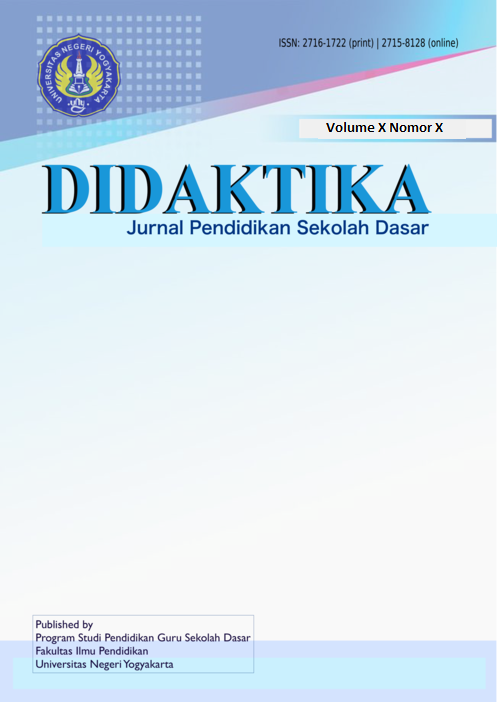CORRELATION OF MISCONCEPTIONS ON STUDENTS' NUMERACY ABILITY IN ANSWERING MATH PROBLEM SOLVING PROBLEMS AT SD NEGERI 57 BANDA ACEH
DOI:
https://doi.org/10.21831/didaktika.v6i2.63152Abstract
References
Han, W., Susanto, D., Dewayani, S., Pandora, P., Hanifah, N., Miftahussururi, Nento, M. N., & Akbari, Q. S. (2017). Materi Pendukung Literasi Numerasi. Jakarta: Kementerian Pendidikan Dan Kebudayaan
Inggit, S. M., Liliawati, W., & Suryana, I. (2021). Identifikasi Miskonsepsi dan Penyebabnya Menggunakan Instrumen Five-Tier Fluid Static Test (5TFST) pada Peserta Didik Kelas XI Sekolah Menengah Atas. Journal of Teaching and Learning Physics, 6(1), 49–68. https://doi.org/10.15575/jotalp.v6i1.11016
Ikram, R. L., Suharto, S., & Setiawani, S. (2018). Analisis Miskonsepsi Siswa dalam Menyelesaikan Permasalahan Persamaan Kuadrat Satu Variabel Ditinjau dari Perbedaan Gender. KadikmA, 9(3)
Maghfiroh, F. L., Amin, S. M., Ibrahim, M., & Hartatik, S. (2021). Keefektifan Pendekatan Pendidikan Matematika Realistik Indonesia terhadap Kemampuan Literasi Numerasi Siswa di Sekolah Dasar. Jurnal Basicedu, 5(5), 3342–3351. https://jbasic.org/index.php/basicedu/article/view/1341
Maison, M., Lestari, N., & Widaningtyas, A. (2020). Identifikasi Miskonsepsi Siswa Pada Materi Usaha Dan Energi. Jurnal Penelitian Pendidikan IPA, 6(1), 32–39. https://doi.org/10.29303/jppipa.v6i1.314
Mukhlisa, N. (2021). Miskonsepsi Pada Peserta Didik. SPEED Journal : Journal of Special Education, 4(2), 66–76. https://doi.org/10.31537/speed.v4i2.403
Mubarokah, A. R., & Hakim, D. L. (2022). Miskonsepsi Matematis Dalam Pemahaman Konsep Pada Materi Aritmatika Sosial. Prosiding Seminar Nasional Matematika Dan Pendidikan Matematika (Sosiodinamika), 469–478. https://journal.unsika.ac.id/index.php/sesiomadika/article/view/7643
Prakosa, F. J. (2003). Perubahan kurikulum sebagai jembatan menuju pendidikan yang kontekstual. 105–112.
Susanto, D., Sihombing, S., Radjawane, M. M., & Wardani, A. K. (2021). Inspirasi Pembelajaran yang Menguatkan Literasi. Jakarta: Kementerian Pendidikan, Kebudayaan, Riset, Dan Teknologi RI.
Sutrisno, L. (2018). Pengembangan Pembelajaran IPA SD [Online]. Artikel. http://www.dikdasebook.com/2018/03/bahan-ajar-cetak-pengembangan.html. Diakses pada tanggal 24 Agustus 2020
Susilana, Johan, A. (2021). Statistik Pendidikan 2021. Badan Pusat Statistik. https://www.bps.go.id/publication/2021/11/26/d077e67ada9a93c99131bcde/statistik-pendidikan-2021.html
Sari, B. P., & Pedro, U. S. (2023). Analisis Miskonsepsi Siswa Dalam Pemecahan Masalah Matematika Materi Pokok SPLDV Ditinjau Dari Gaya Belajar Siswa. 69–83.
Salsabilah, S. ., & Rahaju, E. . (2022). Miskonsepsi Peserta Didik pada Materi Sistem Persamaan Linear Dua Variabel (SPLDV) Ditinjau dari Tingkat Kecerdasan Logis Matematis. Jurnal Ilmiah Pendidikan Matematika, 10(1), 45–58. https://jurnalmahasiswa.unesa.ac.id/index.php/mathedunesa/article/view/25554/23429
Winata, A., Widiyanti, I. S. R., & Sri Cacik. (2021). Analisis Kemampuan Numerasi dalam Pengembangan Soal Asesmen Kemampuan Minimal pada Siswa Kelas XI SMA untuk Menyelesaikan Permasalahan Science. Jurnal Educatio FKIP UNMA, 7(2), 498–508. https://doi.org/10.31949/educatio.v7i2.1090
Vhalery, R., Setyastanto, A. M., & Leksono, A. W. (2022). Kurikulum Merdeka Belajar Kampus Merdeka: Sebuah Kajian Literatur. Research and Development Journal of Education, 8(1), 185. https://doi.org/10.30998/rdje.v8i1.11718
Yudi Marihot, Sapta Sari, dan A. E. (2022). Buku Metode Penelitian Kualitatif & Kuantitatif. In Jurnal Multidisiplin Madani (MUDIMA): Vol. Vol. 1 (Issue April).
Downloads
Published
How to Cite
Issue
Section
Citation Check
License
- Authors retain copyright and grant the journal right of first publication with the work simultaneously licensed under a Creative Commons Attribution License that allows others to share the work with an acknowledgement of the work's authorship and initial publication in this journal.
- Authors are able to enter into separate, additional contractual arrangements for the non-exclusive distribution of the journal's published version of the work (e.g., post it to an institutional repository or publish it in a book), with an acknowledgement of its initial publication in this journal.
- Authors are permitted and encouraged to post their work online (e.g., in institutional repositories or on their website) prior to and during the submission process, as it can lead to productive exchanges, as well as earlier and greater citation of published work.






